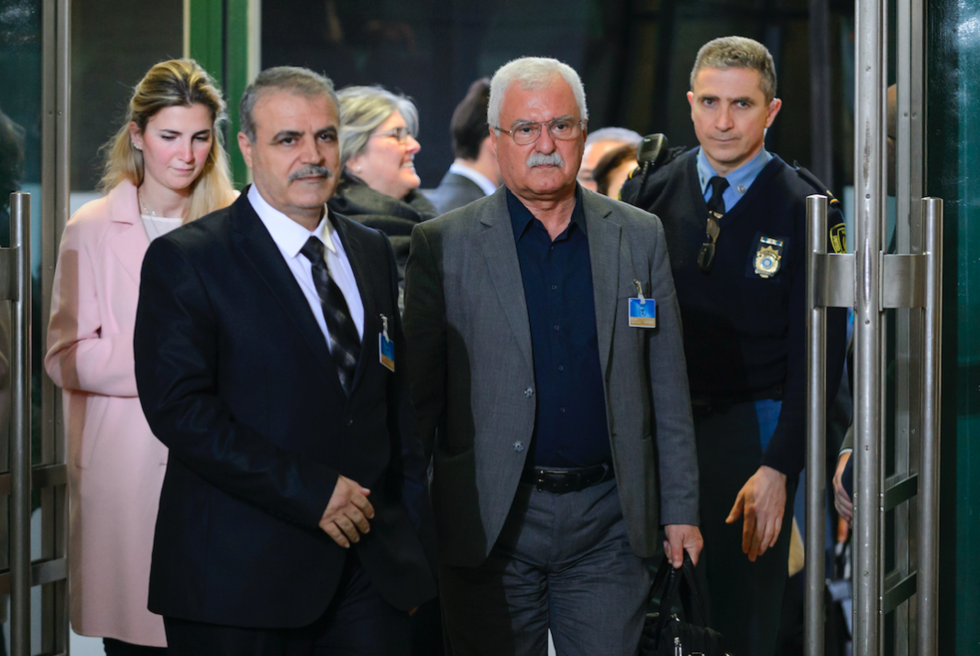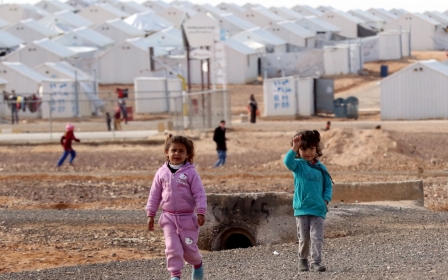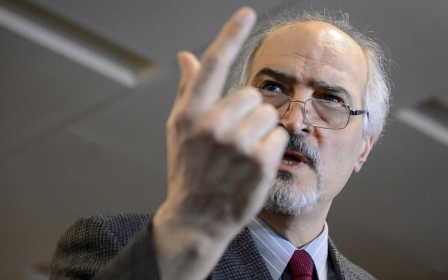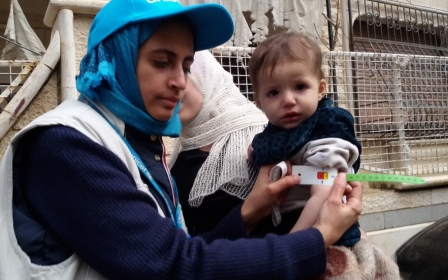Syria peace talks officially start in Geneva as siege devastation mounts

Syrian peace talks have formally commenced in Geneva after a rocky run-up to the talks, the UN peace envoy said on Monday.
“We are starting officially the Geneva talks... The discussions are starting." Staffan de Mistura told reporters. "We will meet the government tomorrow (Tuesday) and will invite the HNC (High Negotiations Committee) tomorrow afternoon to go deeper into the issues raised."
The main Syrian opposition umbrella group also said that it would "strive to join the political process" after receiving "positive messages" from de Mistura about ending Russian air strikes and stopping sieges.
The announcement comes after the main opposition group met formally with the UN special envoy as part of the latest attempt to try and bring about an end to the devastating conflict.
The preliminary meeting was the first to take place between the HNC and de Mistura.
"We came to find a solution," Mohammed Alloush, the chief negotiator for the main Syrian opposition body, the Jaish al-Islam rebel group, told AFP after arriving in Geneva.
However “there is no common ground with the regime. The regime wants to eliminate the opposition."
After the meeting, HNC accused Syrian government ally Russia of helping to turn Syrian President Bashar al-Assad into a "new Hitler" by supporting his forces in the war-ravaged country.
"Russian regime will create a new Hitler. We are suffering from a Hitler in Syria," said HNC spokesman Salem al-Meslet.
The Syrian government and its ally Moscow consider Jaish al-Islam to be "terrorists" who should not be part of negotiations to end Syria's almost five-year-old civil war.
The talks were dealt a small blow on Sunday evening when the Syrian Democratic Council - a US-backed coalition made up mainly Syrian Kurds and some Arab fighters – said that it would not participate
"We decided on Sunday night to suspend our participation in negotiations so long as the five Kurdish and one Turkman delegates from our list do not receive invitations from UN mediator Staffan de Mistura," Syrian Democratic Council co-president Haytham Manna told AFP.
The SDC has sought to take part in the Geneva talks despite being excluded from the HNC.
Sieges take centre stage
The deteriorating humanitarian situation in Syria is expected to dominate the peace talks with international pressure growing to break a host of sieges in Syria.
On Monday the UN reported eight more deaths from insufficient medical care in one of the many towns besieged by government or rebel forces.
The HNC is insisting that humanitarian aid reach towns under government siege before it will fully participate in the peace talks.
In an apparent goodwill gesture, Syria's government agreed "in principle" Monday to allow aid into three besieged towns, including starvation-struck Madaya, the UN said.
The talks are part of the biggest push to date to chart a way out of the tangled Syrian war that has killed more than 260,000 people and forced millions from their homes since the violence began in March 2011.
The UN has recently added four areas to its high-profile list of areas under siege in Syria, including Yarmouk and Madaya, bringing the number to 19, IRIN reported on Monday.
De Mistura's brief in Geneva is to coax the warring sides into six months of "proximity talks" as part of an ambitious roadmap agreed by the many outside powers embroiled in the war.
The plan, hammered out in Vienna in November, envisions elections within 18 months, but the key question about the future of Assad - backed by Iran and Russia - was left until later to resolve.
The UN human rights chief on Monday said that no amnesty should be possible for people suspected of committing war crimes or crimes against humanity, in a seeming indication that Assad would not be allowed to walk free as part of any deal, something the opposition has always said it fears.
"We do have a principled position in the United Nations that no amnesties should be considered for those suspected of having committed crimes against humanity or war crimes," UN rights chief Zeid Ra'ad al-Hussein told reporters in Geneva.
"Naturally after five years of this most gruesome spectacle of seeing the Syrian public subjected to public executions we hope and pray that the talks being mediated by (UN Syria envoy) Staffan de Mistura will lead to the end of all of these horrific abuses, human rights abuses, violations of international humanitarian law," he said.
He also condemned the tragic scenes unfolding in the besieged city of Madaya, where 46 people have starved to death since December, according to the Doctors Without Borders (MSF), which warned on Saturday that dozens more were on the verge of death.
"Clearly, when looking most recently at the forced starvation of the people of Madaya, and knowing there are 15 other besieged towns and cities, this is not just a war crime but a crime against humanity, if proven in court," Zeid said.
New MEE newsletter: Jerusalem Dispatch
Sign up to get the latest insights and analysis on Israel-Palestine, alongside Turkey Unpacked and other MEE newsletters
Middle East Eye delivers independent and unrivalled coverage and analysis of the Middle East, North Africa and beyond. To learn more about republishing this content and the associated fees, please fill out this form. More about MEE can be found here.




